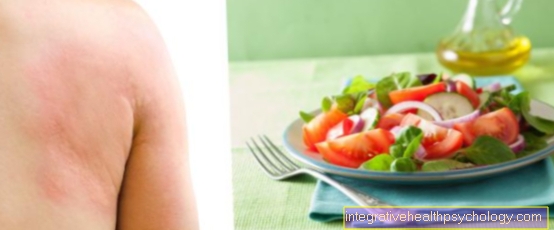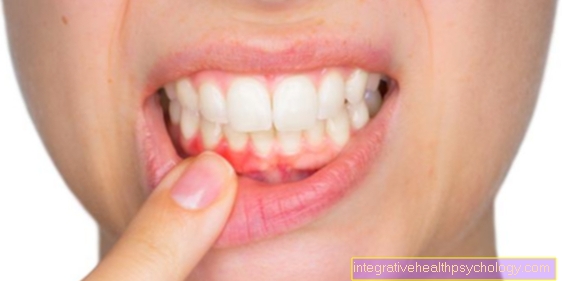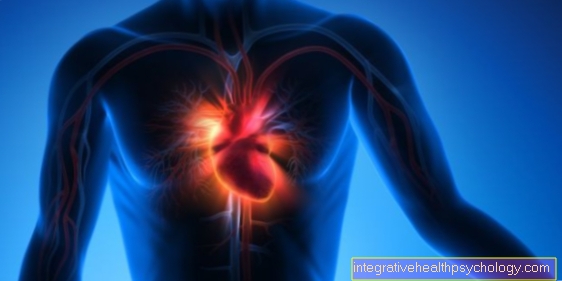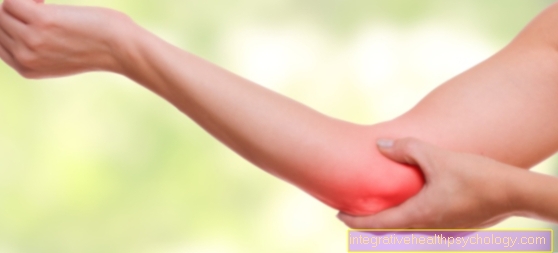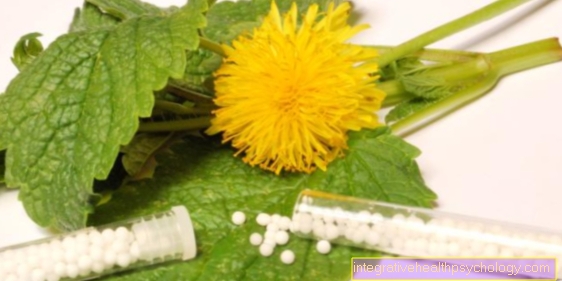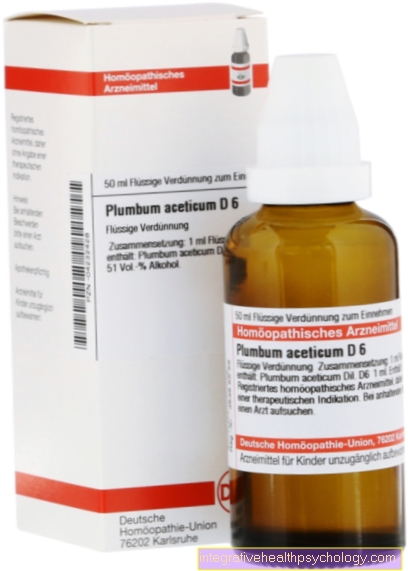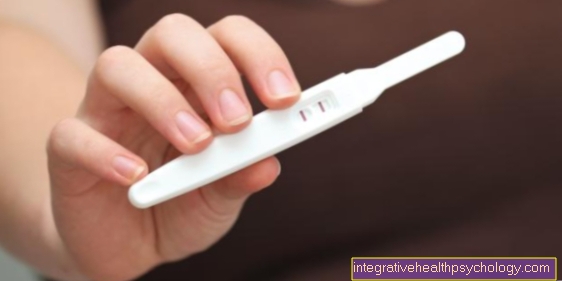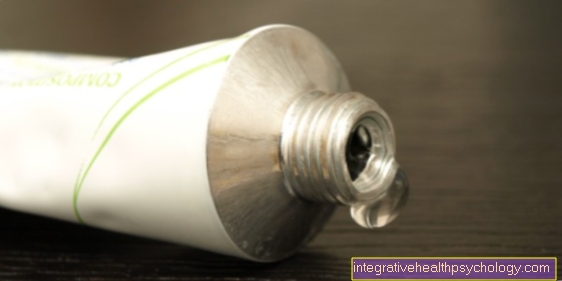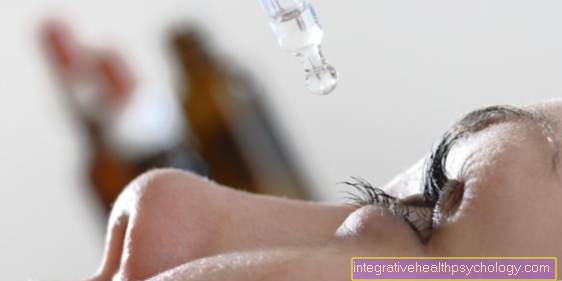Vaginal dryness
introduction
Vaginal dryness is a common symptom that many women struggle with. The vagina naturally produces secretions that keep the mucous membranes moist and make it difficult for pathogens to colonize them.
Dry mucous membranes, on the other hand, are more prone to infections of all kinds, as germs can better adhere to dry, rough mucous membranes. Vaginal dryness is often a subjective feeling of the woman concerned. There are no objective measured values from when it is actually vaginal dryness.
You might also be interested in: Pain at the entrance to the vagina

In affected women, vaginal dryness manifests itself particularly often in the context of sexual intercourse, as the secretion production of the vagina is also significantly restricted.
However, moisture is particularly important during sexual intercourse, so that the friction does not cause injuries and pain in the genital area for the woman. Women with pronounced vaginal dryness often experience significant restrictions in their sex life, which can be very stressful for those affected. Women who suffer from a dry vagina should therefore not hesitate and ask their gynecologist for advice.
What might also interest you: Insufficient vaginal moistening (lubrication) - therapy and prognosis
causes
The causes of vaginal dryness can vary widely.
Depending on the age at which the symptoms appear, there can be different causes. Hormonal factors are particularly often the reason for vaginal dryness. According to this, vaginal dryness is most common in women after the menopause. This is because the level of female sex hormones (estrogens) decreases significantly with the onset of menopause. However, estrogens play a key role in the moistening of the vagina, blood flow in the genital tract and the functionality of the female sexual organs. Due to the falling sex hormone levels, these functions decrease accordingly. The blood flow to the vagina is reduced, the tissue is broken down over time, which manifests itself in thinner labia and more sensitive skin in the genital area, and the moisture in the vagina can be significantly reduced. It is estimated that every third woman suffers from vaginal dryness with the onset of menopause.
Hormone fluctuations can also occur in other life situations, which can cause vaginal dryness. Examples are pregnancy or breastfeeding. Even if hormonal contraceptives are taken or a woman's ovaries are removed, changes in the hormonal balance occur that can result in vaginal dryness. In the case of vaginal dryness during pregnancy or the use of hormonal contraceptives, the symptoms usually disappear when these circumstances cease.
The same applies to various other medications that can cause vaginal dryness as a side effect. Vaginal dryness is particularly common in women who are treated for breast cancer with anti-hormonal drugs. The hormone blockers create a menopausal condition and the woman can develop vaginal dryness.
The moistening of the vagina also depends largely on psychological factors. Women who are under a lot of stress and who are generally very busy have problems with vaginal dryness more often, especially during sexual intercourse. Last but not least, vaginal dryness can occur as an accompanying symptom in various diseases. Some nervous diseases can affect sexual functions in later stages, causing vaginal dryness. One example is multiple sclerosis (MS). Vaginal dryness can also occur with diabetes mellitus. Last but not least, lifestyle also influences the moistening of the vagina. Alcohol consumption and smoking as well as excessive intimate hygiene can have negative effects.
Also read our topic: Menopause
Lack of estrogen
A lack of the hormone estrogen is the cause of vaginal dryness in many cases.
This is independent of whether it is a naturally occurring deficiency, such as during the menopause, before the onset of puberty and during breastfeeding, or caused by medication. These include the birth control pill and estrogen blockers as part of breast cancer treatment. A lack of estrogen causes a reduced blood flow to the vagina, negatively affects the elasticity and thickness of the mucous membrane and also affects the activity of the glands in the genital area. These factors, individually or often in combination, can lead to a dry vagina.
Read more on this topic at: Lack of estrogen
Thyroid disease as a cause
Thyroid diseases are common in the population. This is usually either an over- or underactive thyroid, with the result that too many or too few thyroid hormones are produced. Both clinical pictures are associated with a large number of possible symptoms.
If the thyroid gland is underactive, known as hypothyroidism, it can lead to increased dryness of the skin in addition to a few other symptoms. This can also affect the mucous membrane of the genital area. It is important to mention that some thyroid diseases as well as the onset of menopause have a common peak in incidence, which means that both diseases are often most often diagnosed in a similar age range.
As a consequence, in the case of vaginal dryness in middle age, one must think of the possible beginning of menopause, which is often associated with vaginal dryness, and thyroid diagnostics if further symptoms are present. A distinction is usually possible on the basis of characteristic blood values.
Read more on the subject at: Hypothyroidism
Concomitant symptoms
Vaginal dryness can manifest itself with various accompanying symptoms.
The dry mucous membranes are significantly more susceptible to being colonized by pathogens such as vaginal fungus. These can adhere particularly well to the dry surface cells and cause an infection there. Vaginal infections are particularly often manifested by changes in discharge from the vagina, which can, for example, take on a yellow or greenish color or have a bad smell. In addition, it is often increased in its quantity. In addition, there can be pain during sexual intercourse, which is then not only caused by the dry vagina but also by the inflammatory reaction.
Vaginal dryness often manifests itself in an unpleasant itching or burning sensation in the genital area, as the dry mucous membranes rub against each other and cause irritation. Due to the close proximity of the vaginal entrance and urethra, the latter is also often affected when vaginal dryness occurs. The result is a susceptibility to urinary tract infections such as bladder infections, which are primarily expressed by an increased urge to urinate and a burning sensation when urinating.
During sexual intercourse there is usually pain due to the significantly increased friction caused by the lack of moisture in the mucous membranes. The dry vagina can also be uncomfortable for men, as it also leads to increased friction for them. Women with vaginal dryness also complain of slight bleeding of the mucous membranes after intercourse. These are also caused by the fact that the dry mucous membranes are significantly more prone to injury and can quickly tear due to the friction during sexual intercourse. As the vagina is well supplied with blood, slight bleeding occurs as a result, but this usually stops again quickly.
Read more about this under Pain in the labia or clitoris
Vaginal dryness with itching
If the vagina is too dry, increased itching is a frequent accompanying symptom. The often causally reduced blood flow to the vagina or the interference with the natural flora of the vagina with the wrong washing lotions can lead to dryness. As in other parts of the body, dry skin or mucous membrane is associated with an increased feeling of tension, and the affected areas are more prone to injury. This condition can easily worsen as increased itching often leads to scratching, to provide relief from the discomfort. However, this can damage the stressed and dry mucous membrane more easily and infections occur more frequently. Itching can also be a symptom of a bacterial infection of the vagina and, if the vagina is dry, it can be a symptom of both diseases. A gynecological clarification is therefore particularly useful if there is a simultaneous occurrence of discharge, changed vaginal odor or vaginal coatings.
Read more on this topic at:
- Itching in the vagina
- Vagina burns
therapy
Since vaginal dryness can be very stressful for affected women, adequate therapy is all the more important.
If the symptoms are due to a hormonal disorder, for example due to the onset of menopause, this can be compensated for with hormone preparations. However, as these come with some risks and side effects, the intake should be weighed carefully. A detailed consultation with the gynecologist can help to make the right decision in this regard. Alternatively, some hormone-free preparations are now available that also help some women to alleviate the symptoms, e.g. Vagisan® cream. Menopausal homeopathy can also be tried.
If the vaginal dryness is caused by psychological tension and nervousness, relaxation methods can help to get the symptoms under control. Affected women can try yoga or autogenic training, for example. Regular physical exercise also helps to reduce stress and compensate for a lack of exercise in everyday life.
In addition, there are a few things that women with vaginal dryness should keep in mind that may cause their symptoms to improve.
This includes, for example, not using tampons. Only sanitary towels should be used during the menstrual period, as tampons sit directly in the vagina and draw a lot of moisture from the mucous membranes. As a result, these become even drier and more susceptible to infections. Avoiding tampons is therefore very important for women with vaginal dryness.
Adequate intimate hygiene should also be followed. Frequent washing with soaps or other preparations is not recommended as this will dry out the mucous membranes. Clear water is completely sufficient to gently cleanse the genital area and remove as little moisture as possible from the mucous membranes. Affected couples should use lubricating creams to relieve vaginal dryness during intercourse. These effectively help to reduce friction so that there is no pain or injury during sexual intercourse. This also prevents subsequent infections and inflammations.
Homeopathy for vaginal dryness
There are some homeopathic treatment options that are designed to reduce the symptoms of vaginal dryness. These are often used with dry vaginal mucosa in the course of menopause.
For example capsules or tea infusions made from red clover, which are supposed to support the blood circulation and moistening of the vagina via plant-based estrogens. Other herbal supplements containing phytoestrogens can also help. Other homeopathic remedies that can be used can contain wild yams, which are particularly effective when there is a hormonal imbalance between estrogen and progesterone. Black cohosh can also relieve symptoms.
On request, Schuessler salts can be used, whereby in the case of vaginal dryness in particular Calcium Fluoartum No. 1 and Silicea No. 11 (to increase skin elasticity), Kalium Chloratum No. 4 (relieve vaginal dryness) and Sodium Chloratum No. 8 (to regenerate the vaginal mucosa ) can be applied.
Sepia officinalis, Graphites and Thuja occidentalis can be used as further homeopathic globules. It is advisable to consult with the doctor or pharmacist, especially with regard to possible interactions when taking medication at the same time.
Which home remedies help?
If the vagina is dry, some home remedies can be tried first to relieve the discomfort and to moisten the vagina again.
To increase the suppleness and elasticity of the mucous membrane, natural oils are particularly suitable. These include, for example, olive, marigold, sesame and wheat oils. When buying, you should pay attention to good quality. Sitz baths with essential oils are also suitable, as this stimulates the blood flow to the genital organs. Due to the lactic acid bacteria it contains, natural yoghurt can be used in the intimate area, whereby special cures from the pharmacy usually have a much higher level of effectiveness and are more effective.
In addition to home remedies, behavioral measures can also relieve symptoms of vaginal dryness. So soaps and aggressive washing lotions should be avoided in the genital area so that the vaginal mucous membrane does not dry out. Clear water or washing gels specially tailored to the pH value of the vagina are better for intimate hygiene. In addition, lubricating gel can be used for vaginal dryness, which does not improve even with sexual arousal. This will prevent pain and injuries during sexual intercourse. If you tend to get vaginal dryness, you should use sanitary towels rather than tampons during your period, as the latter can also dry out the vagina. Swimming in chlorinated water can also dry out the vagina. You should therefore refrain from visiting swimming pools while the symptoms are occurring.
olive oil
Olive oil is a natural method to make the genital area softer and more supple and to alleviate the symptoms of vaginal dryness, such as itching and burning.
As with the use of other natural oils, care should be taken to use them in pure form and to ensure that they are of good quality when buying. This can prevent any added substances from additionally irritating the vaginal mucosa, which is already stressed.
Which creams help?
There are numerous creams and gels in the pharmacy that are said to provide relief from vaginal dryness. Most products are over the counter and do not require a prescription. However, if hormones are added to the cream and thus contain estrogen, it is usually prescribed by a doctor. A combination of a moisturizing preparation with a lactic acid cure can be useful in order to stabilize the vaginal flora and to lower the pH value to natural acidic values by facilitating the colonization of lactobacilli. This can prevent infections, which are more likely to occur when the vagina is dry. In addition, the cures often have an additional moisturizing effect.
In order to find your way around the wide range of over-the-counter products for vaginal dryness and to choose the best cream or gel type for you, testimonials from other sufferers can be helpful. Pharmacy employees can also recommend products. The difference between gels and creams is that, unlike gels, the latter contain fat and therefore have a different consistency. The hormone-free creams or gels have in common that they usually provide long-lasting moisture, are odorless, easy to use and can often also be used as lubricants. They can be used both in acute cases and over a longer period of time. It can also be useful to bridge the gap until the use of hormone-containing preparations in order to achieve the fastest possible resolution of the symptoms.
Hormone-containing preparations should only be used after consultation with a doctor, as these should only be used if there is evidence of a lack of estrogen and are also contraindicated in some patients, especially women who are undergoing breast cancer therapy. If there is an existing hormone deficiency, especially during the menopause, the local supply of estrogen can be useful, as the hormone effect can stimulate blood flow in the vagina and regeneration of the mucous membrane. This reduces vaginal dryness and makes the skin of the vagina more elastic and less sensitive.
Vagisan®
Vagisan® moisturizing cream is a widely advertised product that can be used for vaginal dryness. It is a hormone-free preparation for symptom relief, which provides moisture and contains nourishing lipids.
It is tailored to the natural acidic pH of the vagina and is available as a classic cream, in the form of vaginal suppositories or a combination of both. In addition to this product, a large number of other creams and gels from the pharmacy are suitable, which are both hormone-free and can contain estrogen. If hormones are an ingredient of the remedy, this usually requires a prescription and must be prescribed by a doctor.
Read more on this topic at: Vagisan®
prevention
Vaginal dryness cannot be avoided in all cases, as the symptoms are often caused by hormone fluctuations, for example during menopause. Chemotherapy or other important medications that can cause vaginal dryness can sometimes not be avoided.
However, in order to prevent vaginal dryness in general, various things can be observed. It is important that no excessive intimate hygiene is practiced. Frequent washing of the genital area, especially with soaps, shower gels and shampoo, makes the mucous membranes very susceptible to dehydration and subsequent infections. Alternatively, mild intimate washing lotions or, even better, just plain water can be used to cleanse the intimate area. This is completely sufficient and is much gentler on the mucous membranes.
If possible, tampons should also not be used, as these remove a great deal of moisture from the vaginal mucous membranes. Sanitary towels are a better alternative. A healthy and balanced lifestyle should also be ensured. Regular alcohol and tobacco consumption should be avoided. Instead, make sure you get enough exercise, a healthy diet and adequate daily fluid intake.
In order to avoid infections if the vagina is dry, cures with lactic acid bacteria can be carried out from time to time. These can be inserted in the form of vaginal capsules and help to maintain the healthy environment in the vagina.
Vaginal dryness during menopause
Vaginal dryness is a common symptom during menopause and also after menopause.
Hormonal influences are the most common cause.The hormone estrogen plays an essential role in the blood flow to the female sexual organs and is significantly involved in the natural building and remodeling processes of the vaginal mucosa. In addition, the activity of the glands located in the intimate area is regulated, which produce a natural, thin secretion of moisture. The hormone also maintains the vagina's natural acidic pH by ensuring that glycogen is available in the vagina. This is then metabolized into lactic acid by the naturally occurring lactobacilli in the vagina.
With the onset of menopause, the work of the ovaries, which are the production site of estrogen, is reduced. This leads to a drop in the hormone level with the resulting reduced blood flow and moisture in the vagina. In addition to vaginal dryness, vaginal atrophy can also occur, which means that the mucous membrane of the vagina becomes thinner and less elastic.
Read more on the subject at: Menopause symptoms
Vaginal dryness during pregnancy
During pregnancy, the female body experiences considerable influences from hormones. If level fluctuations are the rule, vaginal dryness can occur in the course of this, as proper humidification of the vagina is closely linked to the correct dose of estrogen.
Psychological influences can also cause vaginal dryness, especially during pregnancy. Due to the nervousness about the upcoming birth and the new everyday challenges, complaints in the genital area can occur more often. Excessive intimate hygiene can also dry out the mucous membrane.
If your vagina is dry during pregnancy, you should consult your gynecologist. On the one hand, the optimal treatment in the form of creams or gels can be determined, as some products are not suitable for use during pregnancy and the patient does not run the risk of buying the wrong product.
On the other hand, depending on the severity of the dryness, the risk of infections can increase, since the dry vaginal skin is more cracked and more prone to injuries. In addition, urinary tract infections or inflammation of the sexual organs caused by bacteria or yeasts are generally more common during pregnancy. Such infections always require treatment, as they are associated with a higher risk of complications during the course of pregnancy.
Read more on the subject at: Infections in pregnancy
Vaginal dryness after childbirth
Pregnancy and the subsequent birth process are associated with strong hormonal changes in every woman, which in numerous forms have an impact on the mother's body. The level of estrogen, which was very high during pregnancy, drops rapidly with the birth of the child. Low estrogen levels can lead to increased vaginal dryness due to the resulting reduced blood flow to the genital organs and the impaired remodeling processes of the vaginal mucosa.
During breastfeeding, the body deliberately keeps the estrogen level low, as the hormone has a milk-inhibiting effect and this is the only way to ensure sufficient milk supply. Therefore, vaginal dryness caused by the lack of estrogen persists in some women throughout the breastfeeding period. Even if the new mother is unable to breastfeed for medical reasons or does not want to breastfeed from the outset, the estrogen balance needs some time to level off again. Therefore, vaginal dryness is a common symptom immediately after birth.
Vaginal dryness while breastfeeding
As a hormone, estrogen plays an important role in pregnancy, which is why it is increasingly released during this time. Since it inhibits lactation, the hormone level naturally drops sharply with the birth of the child in only a short time in order not to further prevent milk production. However, since estrogen plays an important role in the blood flow to the genital area and is also essential for a healthy vaginal mucosa, the loss of hormones can lead to increased vaginal dryness. The mucous membrane of the vagina can remain dry even during sexual arousal, which can be associated with an increased risk of microcracks and injuries to the vaginal mucous membrane during sexual intercourse. After weaning, the symptoms often improve on their own, as the estrogen production increases again.
Read more on the subject at: Problems in breastfeeding
Vaginal dryness from medication
A variety of medications can affect the intimate area and lead to vaginal dryness. This includes taking contraceptives. In particular, the micropill, i.e. a combination preparation made from gestagens and estrogens, can lead to dehydration of the mucous membrane. Even during breast cancer treatment, which reduces the influence of estrogen on the body through anti-hormone therapy, vaginal dryness can cause vaginal dryness. In addition, some antibiotics, allergy agents (Antihistamines), Heart medication (Beta blockers) and diuretic drugs (Diuretics) lead to vaginal dryness.
Vaginal dryness after taking antibiotics
After taking antibiotics, there is often not only the decline of the pathogen that is actually being fought and that is responsible for the disease, but also the killing of important, naturally occurring bacteria. These include the lactic acid bacteria found in the female genital area. These so-called lactobacilli are essential for a proper vaginal flora and contribute a large part to intimate health.
If these beneficial bacteria perish in the course of antibiotic treatment, it can lead to infections by fungi or other bacteria that gain the upper hand in the natural bacterial balance of the vagina. Candida yeast infections, in particular, can lead to vaginal dryness. It can therefore make sense to use lactic acid cures in the genital area after taking antibiotics or to add lactic acid bacteria to the vagina in order to support the development of healthy vaginal flora.
Vaginal dryness from the pill
Regular pill intake can cause vaginal dryness as a side effect in some women.
This is particularly the case with so-called micropills in low doses, i.e. a combination pill made from the hormones progestin and estrogen or their derivatives. The supply of only small amounts of estrogen through the pill and inadequate production of the hormone by the body, which can be reduced by the external supply of estrogen, leads to vaginal dryness in some cases. This is due to the lack of estrogen, which leads to a reduced blood flow to the tissue of the genital area and to a breakdown of the mucous membrane, which causes vaginal dryness.
If this side effect is associated with taking the pill, you should consult your gynecologist. If necessary, he or she can either change the dose of the preparation or prescribe a pill from another manufacturer to see whether the symptoms can be eliminated in this way. If this is not the case, it may make sense to switch to alternative contraception methods.
Read more on the subject at: Side effects of the pill



